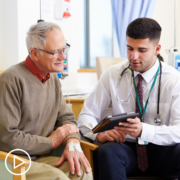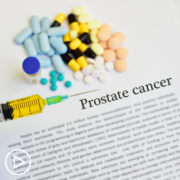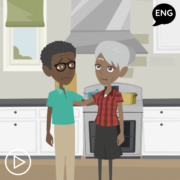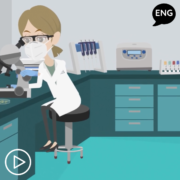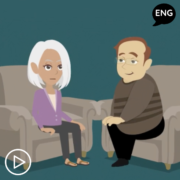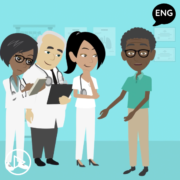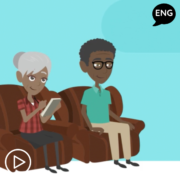Actionable Prostate Cancer Tools and Resources for Optimal Care
As part of our Patient Empowerment Network (PEN) commitment to educating and empowering prostate cancer patients and care partners, our Prostate Cancer Clinical Trials 201 and Thrive programs are here to help. These programs provide clear, actionable information and share tools and resources for patients and loved ones impacted by prostate cancer.
Why Should You Consider a Clinical Trial As a Prostate Cancer Treatment Option?
Though clinical trials may sound intimidating or even scary to some prostate cancer patients, they’re an important part of the treatment option toolbox. Prostate cancer expert Dr. Andrew Armstrong from Duke Cancer Institute shared his expertise in the Prostate Cancer Clinical Trials 201 webinar. “And that’s because clinical trials often can change how we think about cancer, how we treat cancer, can improve cure rates, can improve survival. Most of our drugs and treatments that have been successful in all cancer have been the result of clinical trials.”
For those who have depleted their treatment options, prostate cancer clinical trials are essential in moving research forward to provide both additional treatment options and additional treatment options. According to Dr. Armstrong, “But many patients, their cancer becomes resistant to proven therapies. That’s certainly an area where clinical trials can make a big difference, either to put off chemotherapy or more toxic therapies, or in patients who have exhausted proven therapies. That’s certainly appropriate.”
Clinical trials can also be approached as a way to save some treatment options for later in a patient’s treatment journey. Expert Dr. Sumit Subudhi from The University of Texas MD Anderson Cancer Center shared his perspective. “So, my personal approach is to try to put clinical trials in between and always have something in my back pocket so that if they get a bit exhausted or they want to spend more time with friends and family, they can get the standard of care treatment.”
In clinical trials in which safety is a concern, additional precautions are taken to ensure patients receive extra attention and monitoring. Dr. Subudhi shared about these precautions. “So, in those cases, some trials, if we’re concerned about safety, you’ll be spending more time in the doctor’s office or in a hospital being evaluated.”
What Does It Mean to Thrive With Prostate Cancer?
With essential and optimal care, it is possible to thrive with prostate cancer. In the Thrive Prostate Cancer webinar, prostate cancer expert Dr. Tanya Dorff from City of Hope her perspective about helping patients in their care. “As a medical oncologist, my job is to try to strike a balance between cancer control and quality of life, and I guess that’s how I would put thriving with prostate cancer. It’s not always just about what is the PSA doing, but it’s also about ‘How are you getting around your day-to-day life activities, and are you able to do the things you enjoy?’ So, treatments can be very effective. They can also have significant side effects, and we spend a lot of time day in and day out trying to help men strike a good balance.”
Emotional care and coping with emotions like fear and anxiety is another important aspect of thriving with prostate cancer. Dr. Dorff explained why it’s important for patients to share emotional issues with their care team members. “…it tells us they’re open to it. If we have to ask every patient, ‘Are you having any emotional distress?’, even if someone answers yes and then we make a referral, they may not have actually been ready for it or open to it. So, having the patient come forth and raise that, I think, is really helpful and important.”
Managing Prostate Cancer Treatment Side Effects
Managing treatment side effects are a key piece of thriving with prostate cancer. Expert Dr. Rana McKay from UC San Diego Health shared the importance of learning about potential treatment side effects. “…discussing side effects is a really important part of the discussion for selecting any one given therapy and in general, I think when we talk about the hormonal therapies one of the side effects that people can get is largely fatigue.” Other common side effects with hormonal therapies include muscle loss, bone loss, hot flashes, and decreased libido.
For patients who undergo chemotherapy, common side effects include fatigue, risk of infection, decreased blood count, numbness and tingling in the hands and feet, and swelling in the legs. For immunotherapy, it’s a fairly well-tolerated treatment, but some patients may experience fatigue, rarely some dizziness or lip sensitivity, and numbness.
Common side effects of targeted therapies include fatigue, decreased bone marrow function, gastrointestinal side effects like nausea, and rashes. Some immune therapies can cause immune-related adverse events or overactivation of the immune system developing issues like colitis or pneumonitis, which is inflammation of various organs.
And though sexual dysfunction can sometimes accompany prostate cancer treatment, there are some options for patients. Dr. Dorff shared her knowledge about what patients can do to alleviate sexual dysfunction. “So, this is generally an area that’s managed more by urology. There definitely are things that urologists do to help patients who have lost sexual function due to prostate cancer treatments. They can involve medicines, they can involve slightly more invasive things like a suppository or an intracavernosal injection. There are also more mechanical ways, like a pump device or a penile implant, but generally, anything beyond the first level, which is Viagra, will be handled more by a urologist than a medical oncologist.”
Prostate Cancer Clinical Trials 201 Program Resources
The Clinical Trials 201 program tackles common misconceptions and provides clear, actionable information about trials, sharing tools and resources for patients who are considering clinical trial participation. Clinical Trials 201 includes:
- Understanding Clinical Trial Terminology
- The Benefits of Prostate Cancer Clinical Trials
- Accessing Clinical Trials
- Clinical Trial Safety
- Resource Guides (printer-friendly)
Prostate Cancer Thrive Program Resources
Care decisions are a vital piece of prostate cancer care, and patients can take action to empower themselves toward optimal care by working with their healthcare team. The Thrive program provides tools and resources for living with and beyond prostate cancer. Thrive includes:
- Collaborating on Your Prostate Cancer Care
- Understanding Prostate Cancer Treatment Options
- Resource Guides (printer-friendly)
With prostate cancer research and treatment advances along with more support resources, patients and care partners can become partners in prostate cancer care. By building their prostate cancer knowledge and confidence, patients and their families can make educated decisions as part of a team while also using support resources to truly thrive with cancer. We hope you can use these valuable prostate cancer resources to work toward your optimal patient care.

